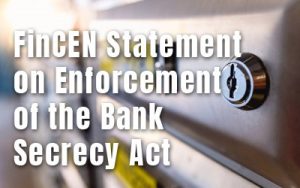
Background
Most BSA requirements apply by their terms only to “financial institutions,” as defined in the BSA and its implementing regulations. The definition of financial institution encompasses a wide variety of institutions, including banks, broker-dealers in securities, money services businesses, and casinos and card clubs, among others. The BSA, in more limited circumstances, prescribes rules of conduct for nonfinancial trades and businesses and individuals. FinCEN may take enforcement actions, to include imposing civil money penalties on financial institutions, nonfinancial trades or businesses, and other persons that violate the BSA, and in a number of instances may take enforcement actions, to include imposing civil money penalties on partners, directors, officers, or employees who participate in these violations.
When FinCEN takes an enforcement action, it will seek to establish a violation of law based on applicable statutes and regulations. FinCEN will not treat noncompliance with a standard of conduct announced solely in a guidance document as itself a violation of law. Regulated parties will be afforded an opportunity to respond to and contest factual findings or legal conclusions underlying any FinCEN enforcement action.
Enforcement Approach
FinCEN has authority to take the following actions when it identifies an actual or possible violation of the BSA or any BSA regulation or order:
- No Action. FinCEN may close a matter with no additional action. FinCEN may reopen the matter if FinCEN obtains new material information concerning the matter or becomes aware of additional or subsequent violations.
- Warning Letter. FinCEN may issue a warning through a supervisory letter or similar communication.
- Equitable Remedies. FinCEN may seek an injunction or equitable relief to enforce compliance when FinCEN believes an entity or individual has violated, is violating, or will violate the BSA or any BSA regulation or order.
- Settlements. As part of a settlement, FinCEN may require both remedial undertakings and civil money penalties.
- Civil Money Penalties. FinCEN may assess a civil money penalty.
- Criminal Referral. If circumstances warrant, FinCEN may refer a matter to appropriate law enforcement agencies for criminal investigation and/or criminal prosecution.
In all matters, FinCEN will consider the need to impose compliance commitments deemed necessary and appropriate to ensure that financial institutions are fully complying with their BSA obligations.
FinCEN considers a range of factors when evaluating an appropriate disposition upon identifying actual or possible violations of the BSA. FinCEN considers both compliance with specific BSA requirements—such as registration, recordkeeping, and reporting requirements—as well as the adequacy of an anti-money laundering (AML) program, including the extent of the AML program’s compliance with pillar requirements. FinCEN strives for proportionality, consistency, and effectiveness. The weight given to any factor in contemplation of the potential dispositions identified above may change based on the relevant facts and circumstances of a case. The factors FinCEN considers include, but are not limited to, the following:
- Nature and seriousness of the violations, including the extent of possible harm to the public and the amounts involved.
- Impact or harm of the violations on FinCEN’s mission to safeguard the financial system from illicit use, combat money laundering, and promote national security.
- Pervasiveness of wrongdoing within an entity, including management’s complicity in, condoning or enabling of, or knowledge of the conduct underlying the violations.
- History of similar violations, or misconduct in general, including prior criminal, civil, and regulatory enforcement actions.
- Financial gain or other benefit resulting from, or attributable to, the violations.
- Presence or absence of prompt, effective action to terminate the violations upon discovery, including self-initiated remedial measures.
- Timely and voluntary disclosure of the violations to FinCEN.
- Quality and extent of cooperation with FinCEN and other relevant agencies, including as to potential wrongdoing by its directors, officers, employees, agents, and counterparties.
- Systemic nature of violations. Considerations include, but are not limited to, the number and extent of violations, failure rates (g., the number of violations out of total number of transactions), and duration of violations.
- Whether another agency took enforcement action for related activity. FinCEN will consider the amount of any fine, penalty, forfeiture, and/or remedial action ordered.

0 Comments